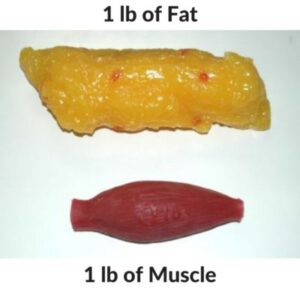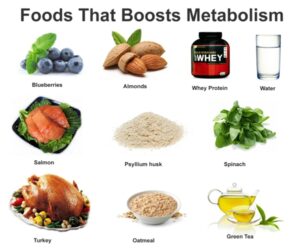When embarking on a fitness journey, one common question arises: “Does muscle weigh more than fat?” It’s a fascinating topic, often shrouded in misunderstanding. To clarify, a pound of muscle and a pound of fat weigh exactly the same—a pound is a pound. However, the difference lies in their volume, composition, and impact on your body. Let’s dive into the details and debunk myths to give you a clear understanding.
Understanding Muscle and Fat

To understand the differences, let’s first define what muscle and fat are:
- Muscle:
- Muscle tissue is dense and compact.
- It’s metabolically active, meaning it burns calories even at rest.
- Muscles are responsible for movement, strength, and posture.
- Fat:
- Fat tissue, or adipose tissue, is less dense and takes up more space in the body.
- It serves as an energy reserve, insulation, and protection for internal organs.
- Fat can be stored under the skin (subcutaneous fat) or around organs (visceral fat).
Density: The Key Difference
The primary distinction between muscle and fat is their density. Muscle is about 18% denser than fat. This means that a given volume of muscle will weigh more than the same volume of fat. To put it visually:
- Imagine a pound of muscle as a compact, lean steak.
- Now picture a pound of fat as a fluffy, jiggly piece of jelly.
Because muscle is denser, a person with a higher muscle mass will look leaner and more toned than someone with the same weight but higher fat mass. This is why body composition is more important than the number on the scale.
Why Muscle vs. Fat Matters
Understanding the relationship between muscle and fat is crucial for setting realistic health and fitness goals. Here’s why:
- Body Composition Over Weight:
- Focusing solely on weight can be misleading. Two people can weigh the same but have entirely different body compositions.
- A fit person with more muscle mass may weigh more but appear slimmer than someone with a higher fat percentage.
- Metabolism Boost:
- Muscle burns more calories at rest compared to fat. This means the more muscle you have, the higher your resting metabolic rate (RMR).
- For every pound of muscle gained, your body burns an extra 6-10 calories per day.
- Health Implications:
- Excess fat, particularly visceral fat, is linked to health risks such as heart disease, diabetes, and certain cancers.
- Muscle, on the other hand, supports healthy aging, improves mobility, and enhances overall strength and endurance.
Muscle vs. Fat: The Scale Dilemma
Stepping on a scale can be frustrating when it doesn’t reflect your hard work. Here’s why you shouldn’t rely solely on weight measurements:
- Weight Fluctuations:
- Your weight can fluctuate due to water retention, food intake, or hormonal changes.
- Building muscle while losing fat may not show a drastic change on the scale, but your body composition will improve.
- Progress Tracking:
- Use methods like body measurements, progress photos, or body fat percentage analysis to track changes.
- Celebrate non-scale victories such as increased strength, better posture, or improved energy levels.
Building Muscle and Losing Fat
Achieving a healthy balance of muscle and fat involves a combination of exercise, nutrition, and recovery. Here’s how you can work towards it:

- Strength Training:
- Incorporate resistance exercises like weightlifting, bodyweight workouts, or resistance bands into your routine.
- Aim for at least two to three sessions per week to build muscle and improve strength.
- Cardiovascular Exercise:
- While cardio is great for heart health and burning calories, balance it with strength training to preserve muscle mass.
- High-Intensity Interval Training (HIIT) can help burn fat while retaining muscle.
- Nutrition:
- Focus on a balanced diet rich in lean proteins, whole grains, healthy fats, and vegetables.
- Ensure adequate protein intake to support muscle repair and growth.
- Avoid crash diets, as they can lead to muscle loss and lower metabolic rate.
- Recovery and Sleep:
- Rest days are essential for muscle recovery and growth.
- Aim for 7-9 hours of quality sleep per night to support hormonal balance and overall health.
Myths About Muscle and Fat
Let’s debunk some common myths:
- “Muscle can turn into fat”:
- Muscle and fat are different types of tissue. One cannot transform into the other.
- However, losing muscle due to inactivity can result in a higher fat percentage.
- “Women shouldn’t lift heavy weights”:
- This myth stems from the fear of becoming bulky. In reality, women lack the testosterone levels needed for significant muscle bulk.
- Strength training helps women build lean muscle, burn fat, and achieve a toned physique.
- “Weight loss is all about cardio”:
- Cardio burns calories but neglecting strength training can lead to muscle loss. A balanced approach yields better results.
The Bottom Line
Muscle doesn’t weigh more than fat—it’s simply denser and takes up less space. When pursuing health and fitness goals, focus on body composition, not just the number on the scale. Building muscle and reducing fat not only improves your appearance but also boosts metabolism and enhances overall health.
Remember, progress takes time. Celebrate your victories, whether it’s lifting heavier weights, fitting into your favorite jeans, or feeling more energized. Your journey is unique, and every step counts towards a healthier, stronger you.
